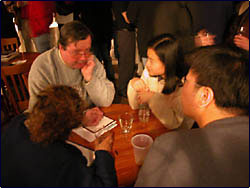
|

The halls and
meeting rooms at Cold Spring Harbor Laboratory were abuzz with conversation
during our visit there for the Biology of DNA conference in February
2003. Standing in front of "posters," visual presentations
of current research, scientists challenged one another and shared
their ideas between sips of wine and nibbles of hors d'oeuvres.
To an outsider, it might have looked like a huge company party.
But scientists know that this informal exchange of ideas and experiences
is as vital to the progress of science as the work done in their
laboratories.

|

|


|

|

|
See
science in action:
Postings from our crew, who prowled
the halls and eavesdropped on conversations at the Biology of
DNA conference.
|

|

|

|

|
Communication
between scientists has always been an important part of research.
Even while
James Watson
and Francis Crick
were racing against chemist Linus Pauling to discover the structure
of DNA in the early 1950s, they exchanged ideas through correspondence
with him. Today, with tens of thousands of researchers around the
world studying DNA, meetings and conferences are an important way
of bringing many researchers together in one place to learn from
each other.
"People hold scientific meetings all over the place,"
says researcher
Eric Lander
. "But
the one meeting you come to religiously is the Cold Spring Harbor
Genome Meeting." Cold Spring Harbor, he says, is where the
masses convene. It’s where molecular biology began, and where
the luminaries in the field continue to come for serious discussion
with each other.
|
|
|

|
|
Meet
some of the luminaries we spoke with live in our Webcast studio
at Cold Spring Harbor.
Jan Witkowski
- Director of CSHL's Banbury Center
Walter Gilbert
- Professor, Molecular and Cellular Biology Dept., Harvard
Sydney Brenner
- Distinguished Professor at the Salk Institute for Biological
Studies
Carol Greider
- Professor of Molecular Biology and Genetics, Johns Hopkins
University
Bruce Stillman
- Director of Cold Spring Harbor Laboratory
James Watson
-
President of Cold Spring Harbor Laboratory
Francis Collins
- Director of the National Human Genome Research Institute
Eric Lander
- Director
of the Whitehead Institute's Center for Genome Research at
the Massachusetts Institute of Technology
|
"People
really do interact and there is really an enormous number of ideas
and experiments designed," notes
Bruce
Stillman
, director of CSHL, speaking about the Laboratory's
conferences. "That comes out of just sitting around and talking
at these meetings."
The ability to share information beyond conferences also has a profound
impact on scientific research.
Francis Collins
,
director of the Human Genome Project (HGP), explains that when the
project began in 1990, one of the big questions was how to distribute
all the information. The Internet has not only simplified that task,
but allowed the HGP to set a new standard in information availability.
Rather than waiting until they publish a paper, scientists post
new information on the Web as soon as it’s available. "If
this information was going to help humankind, there was no justification
for having even a day’s delay in having access," says
Collins, noting that the Web allows anyone to access research results.
"You don’t have to be at Harvard or MIT or Stanford to
be able to work on the genome data," he notes. "It’s
there, you can be in the Third World and have as equal access as
anybody else."
Despite the Web’s usefulness, nothing greases the wheels of
discussion like a tête-à-tête in an informal
setting like the CSHL conferences. Personal contact breaks down
barriers, says
Jan Witkowski
, director
and meeting organizer for Cold Spring Harbor’s Banbury Center.
This is especially true in
Cold
Spring’s bar
, where, he says, "a beer or two will
loosen the tongue, and you might say things about your current work
that you don’t do otherwise."
|

|


